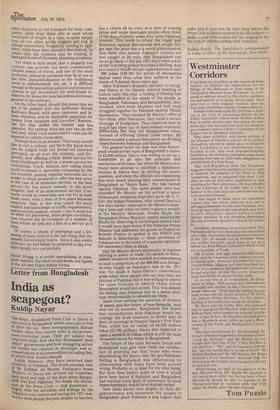India as scapegoat?
Kuldip Nayar
The dingy, dilapidated Press Club in Dacca is one place in Bangladesh where everyone is free to have his say. Here newspapermen discuss frankly what they cannot write in the government-controlled press. Their pet subject has !ong been India: how she has 'dominated' their abject' government and how smuggling across the border has resulted in shortages and increased prices of all commodities including fish, in which their waters abound. Lately, however, they have switched their attention to Pakistan. The much-awaited visit of. Mr Zulfikar Ali Bhutto, Pakistan's Prime Minister, to Dacca has revived old memories, both good and bad, of the days when Bangladesh was East Pakistan. No doubt the discusslot? at the Press Club — and elsewhere — begins with the atrocities and killings by the Pakistani army before and during the 1971 war. But for most people the past, despite its horrors,
has a charm all its own; at a time of soaring prices and acute shortages people often think of the days of plenty when they were Pakistani citizens. This tends to dilute the anger and bitterness against Rawalpindi and people for get that the price rise is a world phenomenon; that these who remain Pakistani citizens are also caught in its toils; that Bangladesh can never go back to the pre-1971 days when a kilo
of rice was being sold at less than a shilling. And in a country wheile the per capita income is only 500 takas (£26.30) the prices of necessities matter more than what they suffered at the
hands of Pakistan three years ago.
After Pakistan's dramatic decision to recognise Dacca at the Islamic summit meeting in Lahore early this year, a feeling of kinship had been rekindled in the minds of the people in Bangladesh. Pakistanis and Bangladeshis, they recalled, were both Muslims and had once struggled together for Pakistan against 'Hindu domination.' They recalled Mr Bhutto's offer of rice when, after liberation, they faced a severe shortage of foodgrains. They expected that he would bail them out of their present economic difficulties. But they felt disappointed when, instead of offering liberal trade terms, Mr Bhutto evaded a serious discussion on dividing assets between Pakistan and Bangladesh.
The general belief till then was that Rawalpindi would accept most of Bangladesh's claims of £3,000 million. Dacca was willing to set up a committee to go into the principle and mechanics of division, but when Mr Bhutto was
found more anxious to establish a diplomatic mission in Dacca than in settling the assets question, and when the officials accompanying him were heard abusing their counterparts in Bangladesh as "damn fools," the tide turned against Pakistan. The same people who had accorded Mr Bhutto on his arrival a more enthusiastic reception than they gave Mr V. V. Gin, the Indian President, who visited Dacca a few days earlier, objected to Mr Bhutto's wearing a 'polo cap' when he went to place a wreath at the Martyrs' Memorial. Sheikh Mujib, the Bangladesh Prime Minister, openly insulted Mr Bhutto by observing in his banquet speech that it would have been better if the Pakistan Prime Minister had addressed the guests in Pushto or Baluchi (Pushto is spoken in the NWFP and Baluchi in Baluchistan — these provinces. of Pakistan are in the midst of a popular agitation for autonomy) than in Hindi.
Had Mr Bhutto shown generosity in matters relating to assets or trade, the people in Bang ladesh would not have minded accommodating at least a proportion of the 400,000 non-Bengalis who fought on Pakistan's side in the 1971 war. No doubt it hurts Dacca's chauvinistic pride when these people still say that they are citizens of Pakistan but it was willing to search for some formula to absorb those whom Rawalpindi would not accept. This was despite the feeling that Pakistan was in a better position economically to rehabilitate them. Apart from settling the question of division of assets and the future of non-Bengalis, both vital for its economy, Bangladesh had hoped that reconciliation with Pakistan would encourage the Arab countries to divert part of their oil earnings to finance Dacca's Five Year Plan, which has an outlay of 44,550 million takas (£2,390 million). Dacca also expected to open a window in China which is still the most favoured nation for many in Bangladesh.
The failure of the talks between Dacca and Rawalpindi may give New Delhi the satisfac tion of pointing out that those who were
adumbrating the theory that the pro-Pakistani feeling in Bangladesh was obfuscating its
relationship with India have been proved wrong. Probably so, at least for the time being. But from New Delhi's point of view it would have been better if Pakistan and Bangladesh had reached some kind of settlement because disenchantment would have started earlier.
New Delhi knows that despite all their disappointments and bitterness the people in Bangladesh place Pakistan a peg higher than India and it may not be very long before the Press Club in Dacca reverts to its old subject — India — and even makes her the scapegoat for the lack of understanding with Pakistan.
Kuldip Nayar, The Spectator's correspondent in India, is editor of the Statesman, New Delhi.


































 Previous page
Previous page